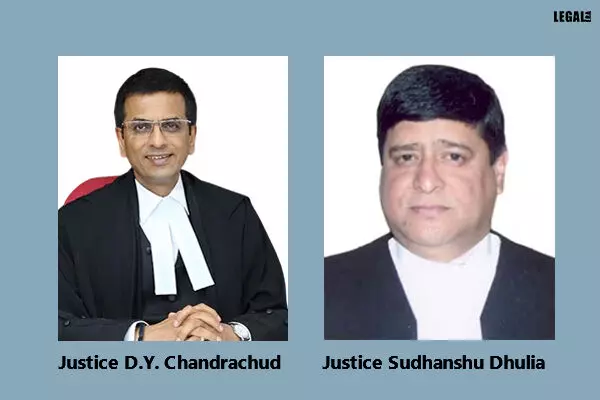- Home
- News
- Articles+
- Aerospace
- Artificial Intelligence
- Agriculture
- Alternate Dispute Resolution
- Arbitration & Mediation
- Banking and Finance
- Bankruptcy
- Book Review
- Bribery & Corruption
- Commercial Litigation
- Competition Law
- Conference Reports
- Consumer Products
- Contract
- Corporate Governance
- Corporate Law
- Covid-19
- Cryptocurrency
- Cybersecurity
- Data Protection
- Defence
- Digital Economy
- E-commerce
- Employment Law
- Energy and Natural Resources
- Entertainment and Sports Law
- Environmental Law
- Environmental, Social, and Governance
- Foreign Direct Investment
- Food and Beverage
- Gaming
- Health Care
- IBC Diaries
- In Focus
- Inclusion & Diversity
- Insurance Law
- Intellectual Property
- International Law
- IP & Tech Era
- Know the Law
- Labour Laws
- Law & Policy and Regulation
- Litigation
- Litigation Funding
- Manufacturing
- Mergers & Acquisitions
- NFTs
- Privacy
- Private Equity
- Project Finance
- Real Estate
- Risk and Compliance
- Student Corner
- Take On Board
- Tax
- Technology Media and Telecom
- Tributes
- Viewpoint
- Zoom In
- Law Firms
- In-House
- Rankings
- E-Magazine
- Legal Era TV
- Events
- Middle East
- Africa
- News
- Articles
- Aerospace
- Artificial Intelligence
- Agriculture
- Alternate Dispute Resolution
- Arbitration & Mediation
- Banking and Finance
- Bankruptcy
- Book Review
- Bribery & Corruption
- Commercial Litigation
- Competition Law
- Conference Reports
- Consumer Products
- Contract
- Corporate Governance
- Corporate Law
- Covid-19
- Cryptocurrency
- Cybersecurity
- Data Protection
- Defence
- Digital Economy
- E-commerce
- Employment Law
- Energy and Natural Resources
- Entertainment and Sports Law
- Environmental Law
- Environmental, Social, and Governance
- Foreign Direct Investment
- Food and Beverage
- Gaming
- Health Care
- IBC Diaries
- In Focus
- Inclusion & Diversity
- Insurance Law
- Intellectual Property
- International Law
- IP & Tech Era
- Know the Law
- Labour Laws
- Law & Policy and Regulation
- Litigation
- Litigation Funding
- Manufacturing
- Mergers & Acquisitions
- NFTs
- Privacy
- Private Equity
- Project Finance
- Real Estate
- Risk and Compliance
- Student Corner
- Take On Board
- Tax
- Technology Media and Telecom
- Tributes
- Viewpoint
- Zoom In
- Law Firms
- In-House
- Rankings
- E-Magazine
- Legal Era TV
- Events
- Middle East
- Africa
Supreme Court refuses to extend term of NCLT members appointed in 2019

Supreme Court refuses to extend term of NCLT members appointed in 2019
The Supreme Court admonished the Bar Association to rather fill in the vacancies to speed up the justice system
The Supreme Court has turned down a plea seeking modification of the tenure of members of the National Company Law Tribunal (NCLT) appointed pursuant to the 2019 notification issued by the Ministry of Corporate Affairs, from three years to five years.
Rejecting the extension for 23 NCLT members, the court clarified that henceforth, the Central Government would be bound by section 413 of the Companies Act, 2013. It prescribed the tenure of the members of NCLT to be five years.
While considering a writ petition filed by the Bar Association against the 2019 notification, the Court stated that an administrative notification for appointment ought to be consistent with the statute.
The bench comprising Justice D.Y. Chandrachud and Justice Sudhanshu Dhulia reckoned that the issue was not something that its Bar Association should be interested in. It indicated that the Association should be concerned about filling up the vacancies at the earliest so that there was no impediment in the justice delivery system.
The Apex Court stated, "The plea of the Bar Association can only be that the vacancies be filled at the earliest. It cannot have a choice in who is a member of the tribunal and for what length of time they are members."
Meanwhile, the Additional Solicitor General, Balbir Singh submitted that presently the tribunal had 30 vacancies. In respect of 15 vacancies, the Selection Committee had shortlisted candidates and made recommendations. He submitted that the process was expected to be completed and final orders of appointment made within four to six weeks.
Further, the bench was apprised of the remaining 15 vacancies, for which an advertisement had been issued. The last date for submitting the applications is 12 August 2022. These vacancies included those arising due to the expiry of the three-year term of the 23 concerned members. The ASG informed that some of those members also applied afresh, and their candidature was being considered along with others.
The question of the extension for the 23 members had come before the high-powered committee chaired by the Chief Justice of India. Upon perusal of relevant documents including antecedence and performance, it passed directions to take necessary steps. Accordingly, in June, the notification was issued extending the tenure for two judicial and six technical members for a five-year term, or till they attained the age of 65.
The counsel for the Association argued that if the 23 members were unfit, they should have been removed in terms of the procedure under the Companies Act.
However, the bench refused to entertain the plea, as the NCLT members themselves had not moved the court. It added that the appropriate course should be to expedite the selection process.
The Court ruled, "Entertaining the submission would lead the court into an evaluation of the suitability, character, and performance of individual members in a petition they are not a party to. Such exercise would be inappropriate. The apt course would be the selection process to continue so that it can be concluded at an early date."



